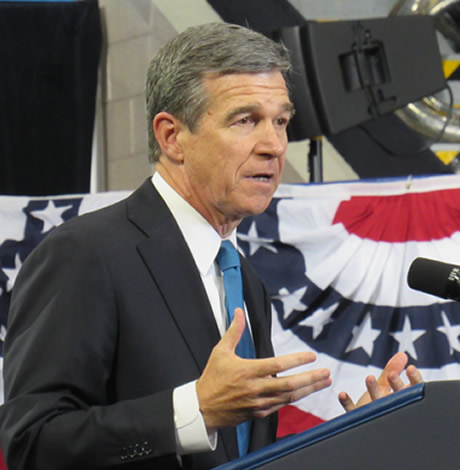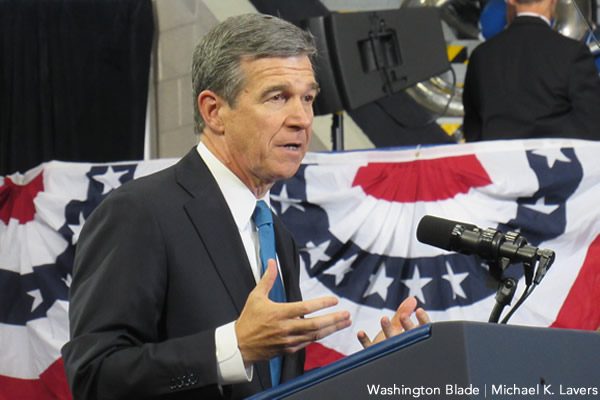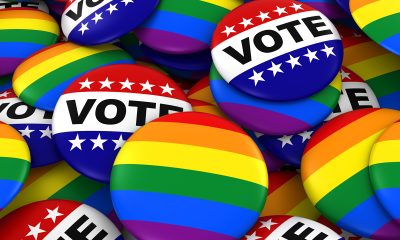National
Cooper signs deal to replace HB2 as LGBT advocates cry betrayal


North Carolina Gov. Roy Cooper has endorsed a HB2 deal vehemently opposed by LGBT advocates. (Washington Blade file photo by Michael K. Lavers)
North Carolina Gov. Roy Cooper signed Thursday a proposal to replace North Carolina’s anti-LGBT House Bill 2 with another law enabling anti-LGBT discrimination, prompting cries of betrayal from LGBT advocates who say he disregarded his campaign promise to sign the repeal in full.
The measure, House Bill 142, was approved on a bipartisan basis Thursday in the Senate by a vote of 32-16 and the House by vote of 70-48 after Republican leaders and Cooper announced the deal late Wednesday night. Cooper announced during a news conference later in the day he signed the bill.
“It doesn’t fully correct it,” Cooper said. “I know we got more to do, and I think some people are unhappy because it doesn’t fully correct it, and I wish we could have, and I wish this time limit on being able to do the additional protections for discrimination could be sooner, but that was the best deal that we could get.”
Cooper insisted “not only provides for LGBT protections, but opens the door for more,” even though no aspect of the new law prohibits discrimination against LGBT people. The governor said as part of the negotiations he was able to stop LGBT rights from coming up for a referendum in North Carolina or a “religious freedom” measure that would enable discrimination against LGBT people.
After having campaigned not only on HB2 repeal, but support for statewide LGBT non-discrimination protections, Cooper said a bill that would bar discrimination against LGBT people throughout North Carolina remains his goal.
“In a perfect world, we would have repealed HB2 today and added full statewide protections for LGBT North Carolinians,” Cooper said. “Unfortunately, our supermajority Republican legislature will not pass these protections. But this is an important goal that I will keep fighting for.”
The new law repeals HB2, but critics say it still enables discrimination. Section 1 bars state agencies, including cities and the University of North Carolina, from the “regulation of access” to multiple-occupancy restroom, showers or changing facilities except in accordance with the legislature, which essentially leaves transgender people seeking to use those facilities vulnerable to harassment or discrimination.
Section 2 prohibits municipalities from enacting ordinances on private employment or public accommodations, which would bar cities from passing LGBT non-discrimination measures in those areas. Section 3 of the bill would sunset that provision on Dec. 1, 2020.
Chris Sgro, executive director of Equality North Carolina, expressed displeasure on Twitter over after worked to elect Cooper to the governor’s office only to have sign the compromise.
Bitterly disappointed in a man I truly believed was the future of North Carolina https://t.co/EJIdj8xwTj #ncpol #ncga
— Chris Sgro (@cristoferosgro) March 30, 2017
In a rare criticism of Democrats, Chad Griffin, president of the Human Rights Campaign, denounced Cooper on Twitter, saying the governor was being misleading by saying he signed HB2 repeal.
.@RoyCooperNC taking credit for repealing #HB2. He did no such thing. Instead he signed new version of #HB2 and betrayed campaign promise.
— Chad Griffin (@ChadHGriffin) March 30, 2017
The outrage from LGBT advocates over Cooper signing the HB2 replacement is a far cry from their view of him last year when HB2 was first signed into law and Cooper, as North Carolina attorney general, announced he wouldn’t defend HB2 against legal challenges in court.
The deal was struck came in the same week the National Collegiate Athletic Association said it will make decisions on events. The NCAA has said North Carolina won’t be considered for championship events through 2022 “absent any change” to HB2. According to the Associated Press, North Carolina cities, schools and other groups have offered more than 130 bids for such events.
After Cooper signed the law, LGBT advocates — the North Carolina NAACP, the Human Rights Campaign, Equality North Carolina, the National Center for Transgender Equality and the Freedom Center for Social Justice — issued a joint statement calling on the NCAA to come out against the measure.
“We call on the NCAA to oppose this shameful HB2.0 bill in North Carolina, and not to reward lawmakers who have passed this so-called ‘deal’ which is an affront to the values we all hold,” the statement says. “This bill is anti-worker, anti-access to the courts, and anti-LGBTQ. It violates all basic principles of diversity, inclusion and basic civil rights. Fundamentally, any moratorium on civil rights is not a compromise, it is a contradiction with the principle of equal protection under the law and our moral values.”
The NCAA has yet to articulate publicly a position on the HB2 deal and whether it will now allow North Carolina to host championship games, although Cooper said during his news conference he expects sports games to return the state.
UPDATE: During a subsequent news conference, NCAA President Mark Emmert said a decision will come next week on whether the changes to HB2 are sufficient enough for the league to plan championship games in the state.
“I’m personally very pleased that they have a bill to debate and discuss,” Emmert said. “The politics of this in North Carolina are obviously very, very difficult. But they have passed a bill now and it will be a great opportunity for our board to sit and debate and discuss it.”
State Department
State Department releases annual human rights report
Antony Blinken reiterates criticism of Uganda’s Anti-Homosexuality Act

Secretary of State Antony Blinken on Monday once again reiterated his criticism of Uganda’s Anti-Homosexuality Act upon release of the State Department’s annual human rights report.
“This year’s report also captures human rights abuses against members of vulnerable communities,” he told reporters. “In Afghanistan, the Taliban have limited work opportunities for women, shuttered institutions found educating girls, and increasing floggings for women and men accused of, quote, ‘immoral behavior,’ end quote. Uganda passed a draconian and discriminatory Anti-Homosexuality Act, threatening LGBTQI+ individuals with life imprisonment, even death, simply for being with the person they loved.”
Ugandan President Yoweri Museveni last May signed the law, which contains a death penalty provision for “aggravated homosexuality.”
The U.S. subsequently imposed visa restrictions on Ugandan officials and removed the country from a program that allows sub-Saharan African countries to trade duty-free with the U.S. The World Bank Group also announced the suspension of new loans to Uganda.
Uganda’s Constitutional Court earlier this month refused to “nullify the Anti-Homosexuality Act in its totality.” More than a dozen Ugandan LGBTQ activists have appealed the ruling.
Clare Byarugaba of Chapter Four Uganda, a Ugandan LGBTQ rights group, on Monday met with National Security Council Chief-of-Staff Curtis Ried. Jay Gilliam, the senior LGBTQI+ coordinator for the U.S. Agency for International Development, in February traveled to Uganda and met with LGBTQ activists who discussed the Anti-Homosexuality Act’s impact.
“LGBTQI+ activists reported police arrested numerous individuals on the basis of their sexual orientation or gender identity and subjected many to forced anal exams, a medically discredited practice with no evidentiary value that was considered a form of cruel, inhuman, and degrading treatment and could amount to torture,” reads the human rights report.
The report, among other things, also notes Ugandan human rights activists “reported numerous instances of state and non-state actor violence and harassment against LGBTQI+ persons and noted authorities did not adequately investigate the cases.”
Report highlights anti-LGBTQ crackdowns in Ghana, Hungary, Russia
Ghanaian lawmakers on Feb. 28 approved the Promotion of Proper Human Sexual Rights and Ghanaian Family Values Bill. The country’s president, Nana Akufo-Addo, has said he will not sign the measure until the Ghanaian Supreme Court rules on whether it is constitutional or not.
The human rights report notes “laws criminalizing consensual same-sex sexual conduct between adults” and “crimes involving violence or threats of violence targeting lesbian, gay, bisexual, transgender, queer or intersex persons” are among the “significant human rights issues” in Ghana.
The report documents Hungarian Prime Minister Viktor Orbán and members of his right-wing Fidesz party’s continued rhetoric against “gender ideology.” It also notes Russia’s ongoing crackdown against LGBTQ people that includes reports of “state actors committed violence against LGBTQI+ individuals based on their sexual orientation or gender identity, particularly in Chechnya.”
The report specifically notes Russian President Vladimir Putin on July 24 signed a law that bans “legal gender recognition, medical interventions aimed at changing the sex of a person, and gender-affirming care.” It also points out Papua New Guinea is among the countries in which consensual same-sex sexual relations remain criminalized.

The Cook Islands and Mauritius in decriminalized homosexuality in 2023.
The report notes the Namibia Supreme Court last May ruled the country must recognize same-sex marriages legally performed outside the country. The report also highlights the Indian Supreme Court’s ruling against marriage equality that it issued last October. (It later announced it would consider an appeal of the decision.)
Congress requires the State Department to release a human rights report each year.
The Biden-Harris administration in 2021 released a memorandum that committed the U.S. to promoting LGBTQ+ and intersex rights abroad.
The full report can be read here.
National
Same-sex couples vulnerable to adverse effects of climate change
Williams Institute report based on Census, federal agencies

A new report by the Williams Institute at the UCLA School of Law finds that same-sex couples are at greater risk of experiencing the adverse effects of climate change compared to different-sex couples.
LGBTQ people in same-sex couple households disproportionately live in coastal areas and cities and areas with poorer infrastructure and less access to resources, making them more vulnerable to climate hazards.
Using U.S. Census data and climate risk assessment data from NASA and the Federal Emergency Management Agency, researchers conducted a geographic analysis to assess the climate risk impacting same-sex couples. NASA’s risk assessment focuses on changes to meteorological patterns, infrastructure and built environment, and the presence of at-risk populations. FEMA’s assessment focuses on changes in the occurrence of severe weather events, accounting for at-risk populations, the availability of services, and access to resources.
Results show counties with a higher proportion of same-sex couples are, on average, at increased risk from environmental, infrastructure, and social vulnerabilities due to climate change.
“Given the disparate impact of climate change on LGBTQ populations, climate change policies, including disaster preparedness, response, and recovery plans, must address the specific needs and vulnerabilities facing LGBTQ people,” said study co-author Ari Shaw, senior fellow and director of international programs at the Williams Institute. “Policies should focus on mitigating discriminatory housing and urban development practices, making shelters safe spaces for LGBT people, and ensuring that relief aid reaches displaced LGBTQ individuals and families.”
“Factors underlying the geographic vulnerability are crucial to understanding why same-sex couples are threatened by climate change and whether the findings in our study apply to the broader LGBTQ population,” said study co-author Lindsay Mahowald, research data analyst at the Williams Institute. “More research is needed to examine how disparities in housing, employment, and health care among LGBT people compound the geographic vulnerabilities to climate change.”
Read the report
Federal Government
Lambda Legal praises Biden-Harris administration’s finalized Title IX regulations
New rules to take effect Aug. 1

The Biden-Harris administration’s revised Title IX policy “protects LGBTQ+ students from discrimination and other abuse,” Lambda Legal said in a statement praising the U.S. Department of Education’s issuance of the final rule on Friday.
Slated to take effect on Aug. 1, the new regulations constitute an expansion of the 1972 Title IX civil rights law, which prohibits sex-based discrimination in education programs that receive federal funding.
Pursuant to the U.S. Supreme Court’s ruling in the landmark 2020 Bostock v. Clayton County case, the department’s revised policy clarifies that discrimination on the basis of sexual orientation and gender identity constitutes sex-based discrimination as defined under the law.
“These regulations make it crystal clear that everyone can access schools that are safe, welcoming and that respect their rights,” Education Secretary Miguel Cardona said during a call with reporters on Thursday.
While the new rule does not provide guidance on whether schools must allow transgender students to play on sports teams corresponding with their gender identity to comply with Title IX, the question is addressed in a separate rule proposed by the agency in April.
The administration’s new policy also reverses some Trump-era Title IX rules governing how schools must respond to reports of sexual harassment and sexual assault, which were widely seen as imbalanced in favor of the accused.
Jennifer Klein, the director of the White House Gender Policy Council, said during Thursday’s call that the department sought to strike a balance with respect to these issues, “reaffirming our longstanding commitment to fundamental fairness.”
“We applaud the Biden administration’s action to rescind the legally unsound, cruel, and dangerous sexual harassment and assault rule of the previous administration,” Lambda Legal Nonbinary and Transgender Rights Project Director Sasha Buchert said in the group’s statement on Friday.
“Today’s rule instead appropriately underscores that Title IX’s civil rights protections clearly cover LGBTQ+ students, as well as survivors and pregnant and parenting students across race and gender identity,” she said. “Schools must be places where students can learn and thrive free of harassment, discrimination, and other abuse.”
-

 South America4 days ago
South America4 days agoDaniel Zamudio murderer’s parole request denied
-

 Maryland5 days ago
Maryland5 days agoMontgomery County police chief discusses arrest of trans student charged with planned school shooting
-

 State Department23 hours ago
State Department23 hours agoState Department releases annual human rights report
-

 Theater4 days ago
Theater4 days ago‘Amm(i)gone’ explores family, queerness, and faith











